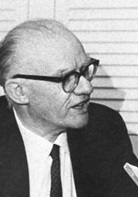Philip Burton (theatre director)
| Philip Burton | |
|---|---|

Burton at an AMDA benefit in 1964
|
|
| Born |
Philip Henry Burton 30 November 1904 Mountain Ash, Wales |
| Died | 28 January 1995 (aged 90) Haines City, Florida, United States |
| Occupation | Teacher, theatre director, producer, writer |
Philip Henry Burton (30 November 1904 – 28 January 1995) was a Welsh teacher, who went on to become an acclaimed radio producer and theatre director. In his later life he emigrated to the United States where he helped found the American Musical and Dramatic Academy in New York City. Despite Burton's successes in many fields, it is for his role in helping the young Richard Burton find his career as an actor, that he is best remembered.
Philip Henry Burton was born in 1904 in Mountain Ash, South Wales. His father was English, and came to Wales to work as a collier, but died in a pit accident when Burton was 14. Burton's mother was Welsh and was a large influence in his academic achievement. In 1925 he graduated from the University of Wales with a double honours degree, in history and mathematics. After leaving university Burton became a teacher and found a job at Port Talbot where he taught English and drama. During the Second World War he was Commanding Officer of the Port Talbot ATC, 499 Squadron.
Burton had a frustrated dream of being an actor, and as a teacher looked for a young protégé through whom he could achieve acting success. He found such a talent in Owen Jones, who went on to appear in films during he 1930s as well as appearing on stage in Hamlet with Laurence Olivier. Jones, an RAF pilot, died through an illness after an accident at his airbase, which left Burton heartbroken. The arrival of a new young talent, Richard Jenkins, brought Burton new hope. The two became close and Burton attempted to adopt Jenkins, but he was 20 days too young to be 21 years older than his ward, a legal requirement. Nonetheless Jenkins became his legal ward and took his surname to become Richard Burton.
The two remained close for almost all of their lives and when Burton began working for the BBC as a producer, Richard would often lend his vocal talents. For the BBC they worked together on the radio plays The Corn is Green (1945) and The Last Days of Dolwyn (1949). Later when Burton had moved to New York, Richard called him at short notice to direct the first production of Camelot, after its original director, Moss Hart, was taken ill. The production was a huge success by the time it reached Broadway. The only time the two fell out was when Richard cheated on his first wife, Sybil, with the actress Elizabeth Taylor. Sybil was Richard Burton's first wife, and Philip Burton saw Sybil and their two children as his family. They reconciled four years later when Taylor approached Burton to help Richard who was struggling in the buildup to John Gielgud's 1964 production of Hamlet.
...
Wikipedia
